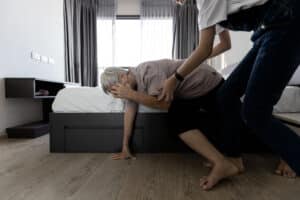
Have you noticed your loved one pausing to steady herself or stumbling even when there’s nothing in her path? She may be dealing with balance issues but is unsure how or whether to bring it up.
For many seniors, balance disorders come with the fear of falling and losing independence. Caregivers often worry about their loved one’s safety, especially when no one is around to help if a fall occurs.
Thankfully, senior fall risk management can help reduce the chance of falls and provide peace of mind for both you and your loved one. By taking proactive steps, you can create a safer environment and minimize risks, even for those living with balance disorders.
Symptoms of a Balance Disorder
Talk with your loved one about any symptoms she’s been experiencing, as understanding these can be an important step in senior fall risk management. Common symptoms of a balance disorder include:
- A sudden feeling of falling, whether or not an actual fall occurs
- A spinning sensation while standing still
- Staggering or unsteady walking
- Blurred vision
- Feeling faint
- Disorientation or confusion
These symptoms can be short-term or long-term and may indicate an increased fall risk for seniors. They can be caused by reactions to medication, inner ear problems, alcohol use, or underlying health conditions such as high blood pressure or heart disease.
Proper senior fall risk management starts with identifying and addressing these symptoms early.
Five Tips for Making Your Loved One’s Home Safer
- Improve Strength and Balance with Core Exercises: Having a strong core can help your loved one stay upright when her balance is off and prevent her from falling if her feet trip over something.
- Add Areas to Grab Onto for Support: This can include grab bars in the bathroom by the toilet and in the shower, railings for all staircases, and even moving furniture around the living room so she can always rest a hand on something as she walks.
- Keep Home Lighting Consistent But Not Too Bright: A sudden bright light like turning on a bright light in a room can bring on a sudden attack of dizziness. Keeping lights on will help her transition from room to room more easily.
- Eliminate Tripping Hazards: Having a balance disorder means it might be more difficult for her to regain her balance if her feet trip over something left on the floor. Getting rid of loose rugs, cords that run across walking areas, and general floor clutter can prevent her from tripping and falling.
- Learn to Change Positions Slowly: If your loved one is standing up or getting out of bed, she should go slow, reducing the risk that she’ll get dizzy or have vertigo.
Looking for More Help? Enlist the Help of a Senior Fall Risk Management Team
If your loved one’s doctors think this may be a long-term health issue or if they aren’t sure when or if it’ll pass, consider making some permanent changes to where your loved one lives so she can continue living there safely. In addition to the changes mentioned earlier, having a professional senior fall risk management team come to the home and evaluate her living space can offer the prevention needed from future falls.
A senior fall risk management professional will work with you and your loved one to keep her in her home by setting up safeguards to reduce the risk of her falling.
If you or an aging loved one are considering Senior Fall Risk Management in Atherton, CA, please contact the caring staff at Aviva In-Home Care today at (415) 463-1400
Aviva In-Home Care provides exceptional senior home care in the Bay Area, including San Francisco, Burlingame, San Mateo, Hillsborough, Atherton, Menlo Park, Palo Alto, Berkeley, Lafayette, Orinda, and surrounding areas.
- What You Should Know About Caring For A Parent With Alzheimer’s - May 23, 2025
- How To Help Your Senior Parent Feel Their Best Every Day - May 14, 2025
- Preventing Falls in the Yard - May 6, 2025




